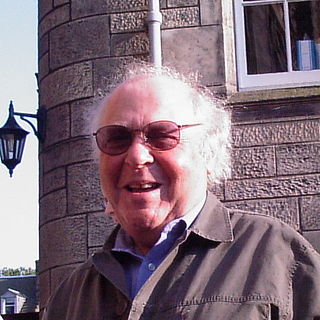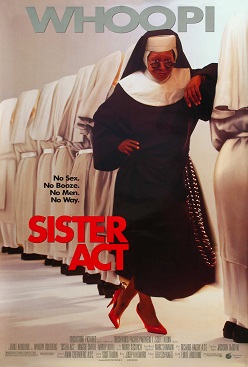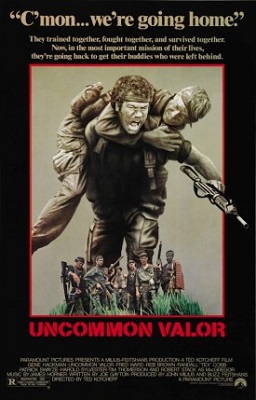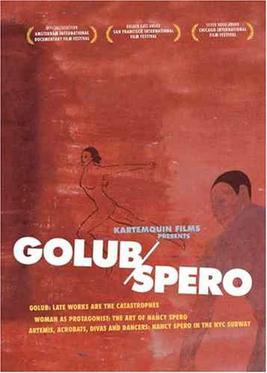
Marshall David Sahlins was an American cultural anthropologist best known for his ethnographic work in the Pacific and for his contributions to anthropological theory. He was the Charles F. Grey Distinguished Service Professor Emeritus of Anthropology and of Social Sciences at the University of Chicago.

Hoop Dreams is a 1994 American documentary film directed by Steve James, and produced by Frederick Marx, James, and Peter Gilbert, with Kartemquin Films. It follows the story of two African-American high school students, William Gates and Arthur Agee, in Chicago and their dream of becoming professional basketball players.

Leon Golub was an American painter. He was born in Chicago, Illinois, where he also studied, receiving his BA at the University of Chicago in 1942, and his BFA and MFA at the Art Institute of Chicago in 1949 and 1950, respectively.

Nancy Spero was an American visual artist. Born in Cleveland, Ohio, Spero lived for much of her life in New York City. She married and collaborated with artist Leon Golub. As both artist and activist, Nancy Spero had a career that spanned fifty years. She is known for her continuous engagement with contemporary political, social, and cultural concerns. Spero chronicled wars and apocalyptic violence as well as articulating visions of ecstatic rebirth and the celebratory cycles of life. Her complex network of collective and individual voices was a catalyst for the creation of her figurative lexicon representing women from prehistory to the present in such epic-scale paintings and collage on paper as Torture of Women (1976), Notes in Time on Women (1979) and The First Language (1981). In 2010, Notes in Time was posthumously reanimated as a digital scroll in the online magazine Triple Canopy. Spero has had a number of retrospective exhibitions at major museums.

Sister Act is a 1992 American musical crime comedy film directed by Emile Ardolino and written by Paul Rudnick. It stars Whoopi Goldberg as a lounge singer forced to join a convent after being placed in a witness protection program. It also features Maggie Smith, Kathy Najimy, Wendy Makkena, Mary Wickes, and Harvey Keitel.
The refrigerator mother theory, also known as Bettelheim's theory of autism, is a largely abandoned psychological fringe theory that the cause of autism is a lack of parental, and in particular, maternal emotional warmth. Evidence against the refrigerator mother theory began in the late 1970s, with twin studies suggesting a genetic etiology, as well as various environmental factors. Modern research generally agrees that there is a largely epigenetic etiology of autism spectrum disorders.

John Phillip Law was an American film actor.
Steve James is an American film producer and director of several documentaries, including Hoop Dreams (1994), Stevie (2002), The Interrupters (2011), Life Itself (2014), and Abacus: Small Enough to Jail (2016).

"Quinn the Eskimo (The Mighty Quinn)" is a folk-rock song written and first recorded by Bob Dylan in 1967 during the Basement Tapes sessions. The song's first release was in January 1968 as "Mighty Quinn" in a version by the British band Manfred Mann, which became a great success. It has been recorded by a number of performers, often under the "Mighty Quinn" title.

Uncommon Valor is a 1983 American action war film directed by Ted Kotcheff and starring Gene Hackman, Fred Ward, Reb Brown, Randall "Tex" Cobb, Robert Stack, Patrick Swayze, Harold Sylvester and Tim Thomerson. Hackman plays a former U.S. Marine colonel who puts together a rag-tag team to rescue his son, who he believes is among those still held in Laos after the Vietnam War.

ITVS is a service in the United States which funds and presents documentaries on public television through distribution by PBS and American Public Television, new media projects on the Internet, and the weekly series Independent Lens on PBS. Aside from Independent Lens, ITVS funded and produced films for more than 40 television hours per year on the PBS series POV, Frontline, American Masters and American Experience. Some ITVS programs are produced along with organizations like Latino Public Broadcasting and KQED.
Kartemquin Films is a four-time Oscar-nominated 501(c)3 non-profit production company located in Chicago, Illinois, that produces a wide range of documentary films. It is the documentary filmmaking home of acclaimed producers such as Gordon Quinn, Steve James, Peter Gilbert, Maria Finitzo, Joanna Rudnick, Bing Liu, Aaron Wickenden, and Ashley O’Shay (Unapologetic).

Inquiring Nuns is a 1968 Kartemquin Films production directed by Gordon Quinn and Gerald Temaner. The documentary film features Sisters Marie Arne and Mary Campion, two young Catholic nuns who visit a variety of Chicago locales to ask people the question, "Are you happy?" They meet a variety of individuals ranging from hippie musicians to intellectuals, whose responses are everything from the mundane to the spiritual. The film was directly influenced by Jean Rouch's Chronique d'un été, which Quinn and Temaner had watched at Doc Films while they were undergraduates at the University of Chicago. The film was shot on Kartemquin's “Camera #1”, a custom-modified crystal sync Auricon with a used manual zoom lens Quinn purchased from Albert Maysles, and to which he added a World War II gunner handle bought from a pawn shop as an extra grip for steadiness.

The Interrupters is a 2011 documentary film, produced by Kartemquin Films, that tells the story of three violence interrupters who try to protect their Chicago communities from the violence they once employed. It examines a year in which Chicago drew national headlines for violence and murder that plagued the city.

A Good Man is a 2011 documentary film about Tony Award-winning dance choreographer, Bill T. Jones, and his efforts to create the dance-theatre piece, "Fondly Do We Hope...Fervently Do We Pray", a salute to Abraham Lincoln for Chicago's Ravinia Festival. A Good Man details Jones's personal struggles with race and coming to grips with the legacy of the Lincoln Presidency and the American Civil War. From the initial pre-production to the show's final performance, the documentary follows Jones as he attempts to connect with his dancers and convey the spirit of the civil rights movement that has inspired him as an artist.

Prisoner of Her Past is a 2010 documentary film, produced by Kartemquin Films, that follows the journey of Chicago Tribune music critic Howard Reich as he travels to Europe to discover why his elderly mother, Sonia Reich, believes people are trying to kill her.

Golub is a 1988 documentary film, produced by Kartemquin Films, that examines the life and work of controversial painter, Leon Golub. Inspired by war, political oppression and the fight for Free Speech, Golub and his paintings are famous for their depictions of extreme violence. Also featured prominently in the film is his wife, anti-war feminist and artist, Nancy Spero. The documentary tracks Golub from starting with a blank canvas to a touring North American exhibition and eventually to an exhibition in Northern Ireland.

Judy Hoffman is an American filmmaker and arts activist based in Chicago. She graduated from Northwestern University with a MFA and currently holds a faculty position at the University of Chicago. Hoffman has played a major role in the development of Kartemquin Films, a documentary filmmaking company founded in Chicago in 1966. Hoffman has worked with extensively with Kwakwaka’wakw, a First Nation in British Columbia, to produce films. Hoffman has brought activism to her films, and continues to show different facets of the city of Chicago.
Peter Kuttner is a Chicago filmmaker, activist, and cameraman. He is known for his early socially-conscious documentary films that touch on topics such as opposition to United States involvement in the Vietnam War, gentrification of Chicago, racism, and social class. He produced many of these with the film collective Kartemquin Films, of which he was an original member. He is best known for his work on the film The End of the Nightstick (1993) with Cindi Moran and Eric Scholl, which documented police brutality in Chicago and torture allegations against commander Jon Burge. Kuttner has worked extensively in activism and community service, and was a founding member of activist group Rising Up Angry. Kuttner has worked with many collaborators including Kartemquin Collective founder Gordon Quinn, and filmmakers Haskell Wexler and Robert Kramer. He is also known for camera work on a number of major motion pictures including Man of Steel and Source Code.
Peter Gilbert is an American documentary filmmaker. He was the cinematographer and one of the producers of Hoop Dreams, a 1994 documentary about two teenage basketball players in Chicago. He has worked on several films for Kartemquin Films, including Vietnam, Long Time Coming, At the Death House Door, and In the Game. He was nominated for a Primetime Emmy for Exceptional Merit In Nonfiction Filmmaking in 2005 for producing With All Deliberate Speed, a documentary about Brown v. Board of Education. Prior to Hoop Dreams, he worked on the cinematography of American Dream by Barbara Kopple, and with Haskell Wexler. He is a member of the Academy of Motion Picture Arts and Sciences.














